In the early hours of Dec. 13, Israeli forces raided the offices of the Freedom Theatre, a world-renowned bastion of artistic expression in the occupied West Bank city of Jenin. The soldiers ransacked the building and defaced it with graffiti bearing Jewish symbols, before violently abducting three members of the theater’s community from their homes: artistic director Ahmed Tobasi, producer Mustafa Sheta, and a graduate of the theater’s performing arts program, Jamal Abu Joas.
Tobasi was released the next day; Abu Joas a week later. Sheta, however, was sentenced to six months in administrative detention — a form of arrest that enables Israel to put anyone it deems a security risk behind bars for an indefinite period, without due process. Sheta, who has joined nearly 3,500 Palestinian administrative detainees in Israeli prisons, was able to speak with his lawyer for only 10 minutes before the lawyer appeared in a closed military trial.
While this attack comes in the context of a brutal crackdown across the West Bank since the start of the Gaza war, it also represents the latest escalation in Israel’s decades-long persecution against the Palestinian cultural sphere in general, and Jenin’s Freedom Theatre in particular. This time, however, Israel’s aggression has not gone unchallenged, and the response from the global artistic community in solidarity with the theater has been unprecedented.
A targeted assault on Palestinian culture
Founded during the First Intifada as the Stone Theatre by Arna Mer-Khamis, the Israeli army destroyed the theater’s original building during its siege of Jenin amid the Second Intifada. In 2006, Arna’s son, Juliano, re-opened the theater in its current venue — a cultural center in the Jenin refugee camp — with Zakaria Zubeidi. Three years later, an unknown individual threw Molotov cocktails at the building while it was empty, and in 2011, a masked gunman killed Juliano as he left the theater.
The Freedom Theatre sees its work as intertwined with the Palestinian struggle for liberation and refuses to ignore decades of Israeli apartheid, colonization, and military occupation. It provides a space for young people in particular to create a political imaginary different from their daily reality, steeped as it is in pervasive dehumanization, oppression, and violence. It enables them to cultivate a vision of equality and freedom and to act it out, making the imagined tangible. It is, in short, a venue of resistance, which is why the theater has been such a frequent target of Israeli attacks over the years.
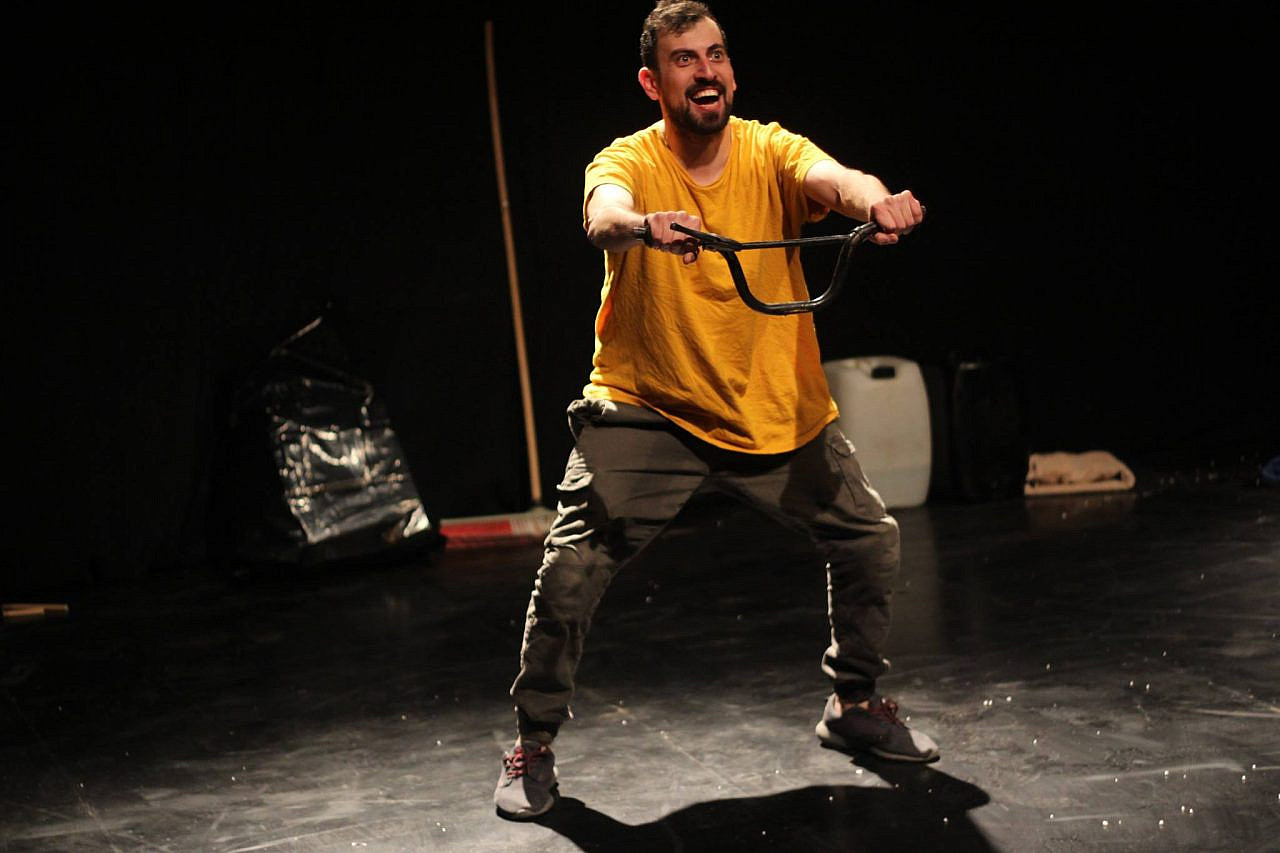
Ahmed Tobasi, artistic director of the Freedom Theatre, performing his play ‘And Here I Am.’ (Courtesy of the Freedom Theatre)
Since its inception, the Freedom Theatre has staged over 25 different plays to tens of thousands of people in Jenin and beyond, including through successful international tours. Its repertoire is overtly political, allowing transformative processes to emerge from the creative process itself.
Among the plays presented in the theater are George Orwell’s “Animal Farm,” Ghassan Kanafani’s “Men in the Sun,” Lewis Carroll’s “Alice in Wonderland,” Harold Pinter’s “The Caretaker,” and original plays such as “Fragments of Palestine,” “Power/Poison,” “Return to Palestine,” “The Siege,” and “Suicide Note from Palestine.” The theater also offers workshops and educational activities for children.
The plays are so powerfully political in part because the theater cannot be separated from its violent surroundings. Jenin has long been a locus of Israeli oppression, but in the past few years it has come to witness military raids on an almost weekly basis. Since October 7, these raids have further intensified, with Israeli forces killing 90 Palestinians in Jenin alone over the past four months.
The December arrests of three members of the Freedom Theatre community thus took place in a dual context: the violence regularly inflicted on Jenin, and the targeted assault on Palestinian culture since the war on Gaza began — a campaign that has included the destruction of an iconic bookstore, Gaza’s main library, the Central Archive Building, and the Rashad al-Shawwa Historical Cultural Centre. These attacks have been read through the lens of cultural genocide: efforts to erase the culture, language, and religion of a specific group.
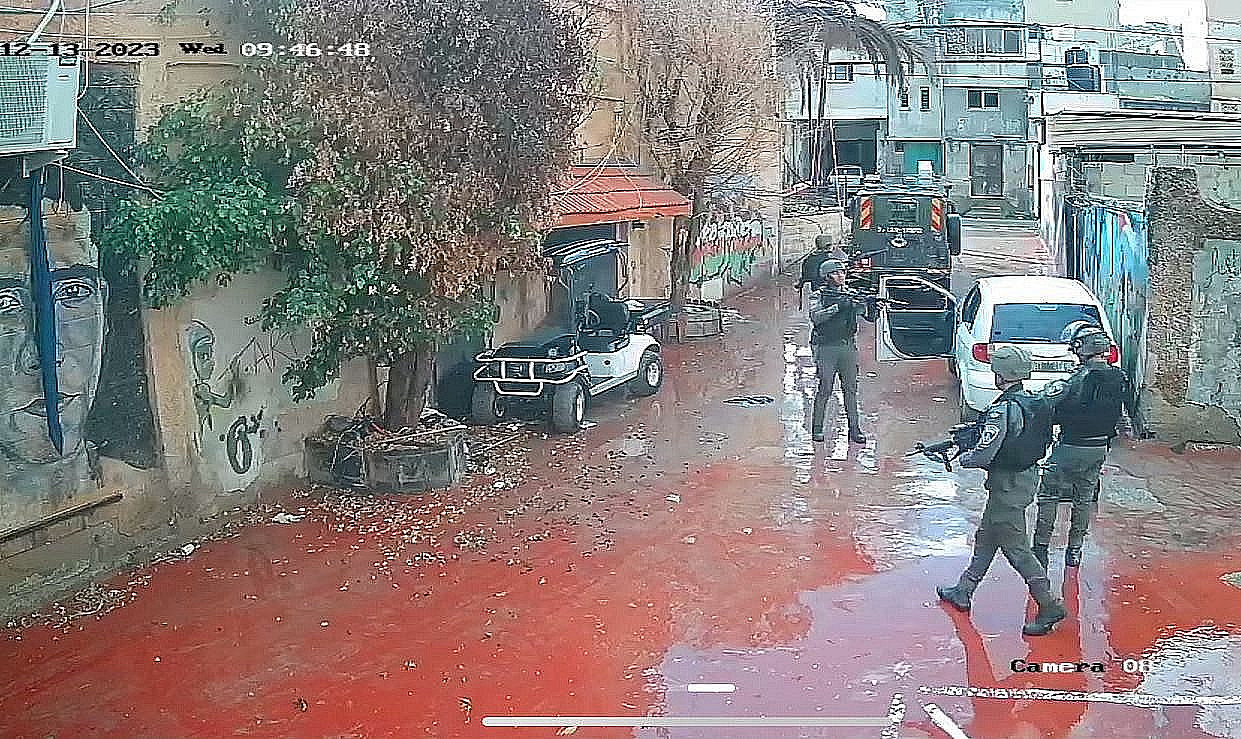
Security camera footage shows Israeli troops outside the Freedom Theatre in the occupied West Bank city of Jenin, December 13, 2023. (Courtesy of the Freedom Theatre)
Yet Israel’s apparent goal of silencing Palestinian cultural critics has backfired. With much of the world aghast at Israel’s brutality in the context of the war on Gaza, the effect of its latest attack on the Freedom Theatre has been to raise the theater’s international profile even higher. After decades of silence in the face of apartheid, occupation, and daily violence experienced by Palestinians, global public discourse and opinion seem to be decisively shifting.
Across the world, public figures are speaking out against Israeli aggression, university campuses are consumed by debates on the issue, and marches of solidarity with Gaza are attracting record numbers of people. There has also been a seismic shift in the world’s understanding of how specific sectors of Palestinian life face routine harassment, dehumanization, and a structural denial of human rights. One such sector, often overlooked but crucially important, is performance arts.
Solidarity from the stage to the streets
Although the Freedom Theatre’s international solidarity networks have been robust for many years, this latest assault on the theater — occurring as it did in the context of Israel’s genocidal aggression in Gaza — generated an unprecedented response from the global artistic community. Open letters garnered hundreds of signatories from industry professionals, while major players like PEN America have released solidarity statements.
In New York, the theater and performing arts community gathered on Dec. 19 for a rapid response rally, standing in solidarity with the Freedom Theatre and with Palestine more generally in protest of the continued detention of the theater’s members. The rally featured a lineup of speakers who shared personal remarks and performances, including excerpts read from the Freedom Theatre’s “The Revolution’s Promise.”
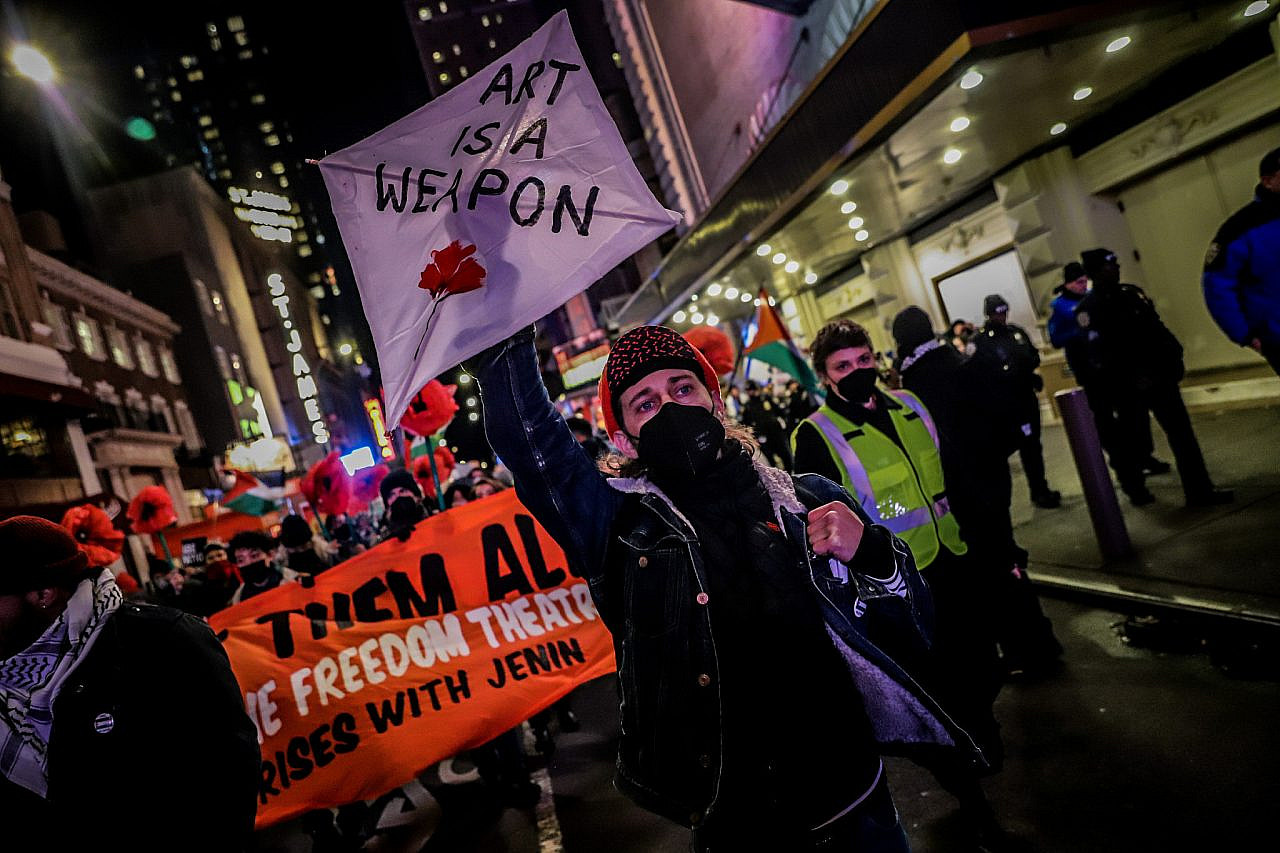
Rally in solidarity with Jenin’s Freedom Theatre in New York, January 15, 2024. (Ash Marinaccio)
Other actions in solidarity with the theater took place in France, Scotland, Mexico, Italy, South Africa, Belgium, Norway, and Sweden. In the United Kingdom, meanwhile, more than 1,000 leading lights in the theater world, including such luminaries as Caryl Churchill, Maxine Peake, Vicky Featherstone, and Dominic Cooke, called for the immediate release of Sheta, Abu Joas, and other residents of Jenin who were detained during Israel’s Dec. 13 raid.
Among a global sweep of solidarity with the Freedom Theatre, UK culture workers have come out firing against the silencing of support for Palestinians within their industry. A new collective named Cultural Workers Against Genocide has critiqued arts organizations in the UK for their hypocrisy, noting that “expressions of solidarity readily offered to other peoples facing brutal oppression have not been extended to Palestinians.”
Paul W. Flemming, general secretary of Equity, the UK’s performing arts and entertainment union, told +972 that the union had sent funds to the Freedom Theatre in the wake of the attack. “Members expect their union to take the same approach in Palestine and Israel as we’ve taken over Ukraine and Russia — supporting artists and trades unionists to survive and fight for peace, dignity, and freedom of expression for artists, irrespective of nationality or background,” he said.
On Nov. 29, scores of workers in the culture sector in London staged a walk-out, with the support of the Freedom Theatre, over the silence of cultural institutions and organizations regarding violence in Palestine. The following day, another open letter was published — signed by luminaries in the UK including Olivia Coleman, Juliette Stevenson, and Hassan Abdulrazzak — which stated: “Far from supporting our calls for an end to the violence, many cultural institutions in Western countries are systematically repressing, silencing and stigmatizing Palestinian voices and perspectives.”
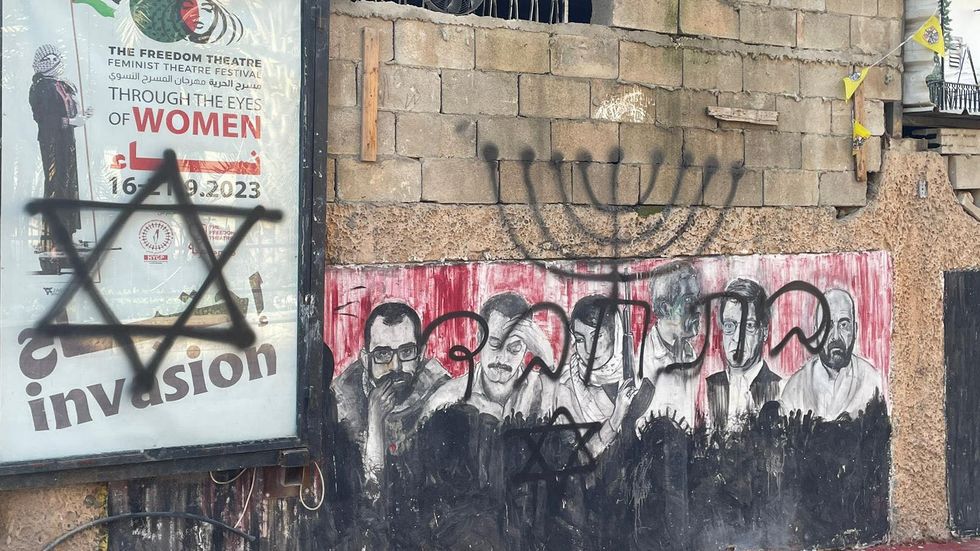
Graffiti of Jewish symbols sprayed by Israeli soldiers during a raid of the Freedom Theatre in the occupied West Bank city of Jenin, December 13, 2023. (Courtesy of the Freedom Theatre)
There has also been on-stage solidarity. On Nov. 29, the International Day of Solidarity with the Palestinian People, the Ramallah-based Ashtar Theatre called on theater companies around the world to read out the Gaza Monologues. Narrated by 33 young people in 2010, following Israel’s first war on the Strip after withdrawing its settlers and soldiers, the play seeks to bring the voices of Gaza’s young people to the world.
The words written back then echo painfully today: “I dream of having ONE day of safety, I’m sure the world is too busy to remember our situation; six years have passed since we wrote our monologues and we are still under siege … When can we live in peace like the rest of the World?” Companies around the world responded to Ashtar Theatre’s call, including in several venues in the United States, South Africa, and across South Asia and the Middle East.
These solidarity campaigns show that there is a growing understanding of the responsibility and commitment of theater makers to their comrades in Palestine — a development that is especially significant in the context of the deliberate attempts to silence Palestinian voices within the culture sector. In October, for example, the Frankfurt Book Fair hastily canceled the award ceremony for Adania Shibli simply because she is Palestinian. The blowback to that decision, combined with the campaigns in the theater world, suggest a fundamentally new path forward for the arts community.
Subversion and liberation
As the world rallies around the Palestinian cause, the attack on the theater and the solidarity campaigns that this provoked exemplify our current moment: the cruelty that Israeli apartheid brings to the everyday lives of Palestinians, but also the change in how the world reacts to this dehumanization.
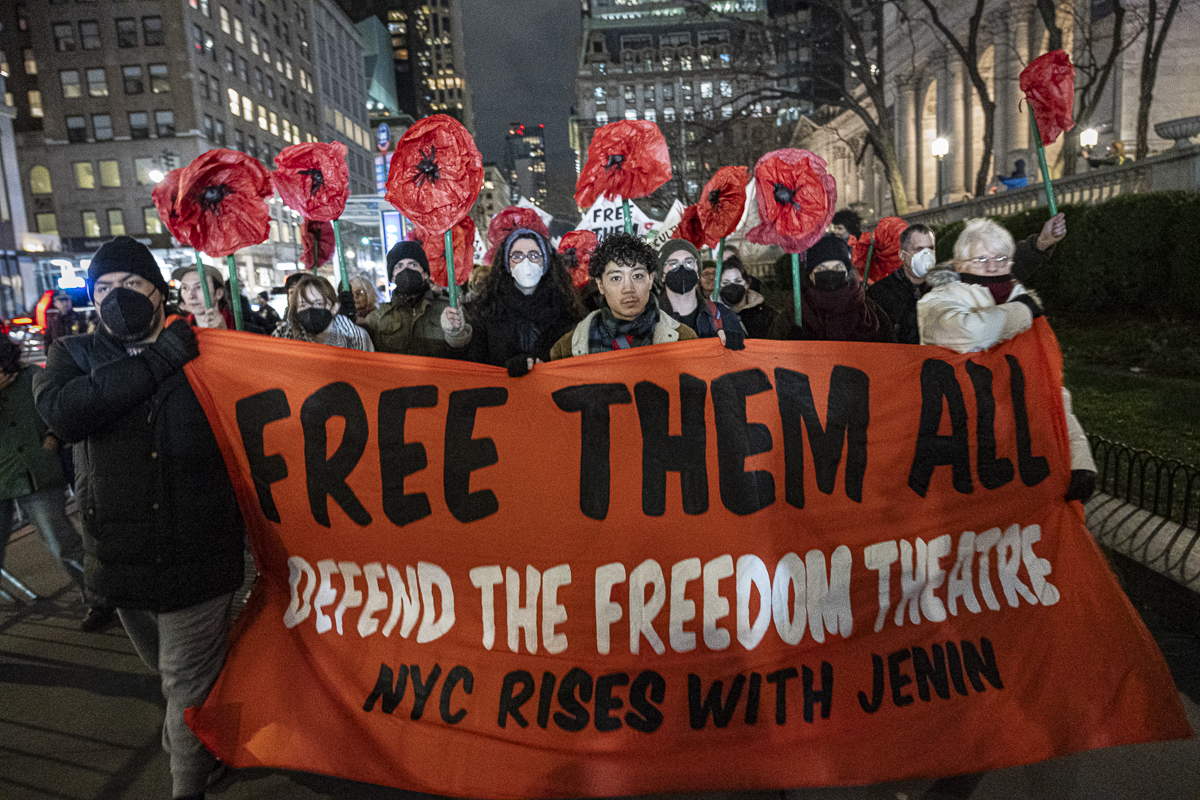
Rally in solidarity with Jenin’s Freedom Theatre in New York, January 15, 2024. (Ken Schles)
Two months after the raid on Jenin’s Freedom Theatre, its producer Mustafa Sheta remains in administrative detention. But it is clear the global arts community is not returning to (show) business as usual, and will continue to fight for Palestinian freedom. The arts have always been a powerful mechanism of subversion and liberation, which is precisely why Israel is cracking down on Palestinian cultural life.
On Feb. 13, it was announced that the Freedom Theater has been nominated for a Nobel Peace Prize. The theater responded: “The Freedom Theatre is an artistic movement made possible by the collective effect of thousands of people, starting from Jenin Refugee Camp in Palestine and rippling across the world.”
Dana Mills is a writer, activist, dancer, and the +972/ Local Call resource development manager. She is the author of Dance and Politics: Moving beyond Boundaries (2016), Rosa Luxemburg (2020), and Dance and Activism (2021). Her fourth book, a collection of essays about and against war, is forthcoming in 2024 with Five Leaves Press.
+972 Magazine is an independent, online, nonprofit magazine run by a group of Palestinian and Israeli journalists. Founded in 2010, our mission is to provide in-depth reporting, analysis, and opinions from the ground in Israel-Palestine. The name of the site is derived from the telephone country code that can be used to dial throughout Israel-Palestine.
Our core values are a commitment to equity, justice, and freedom of information. We believe in accurate and fair journalism that spotlights the people and communities working to oppose occupation and apartheid, and that showcases perspectives often overlooked or marginalized in mainstream narratives.

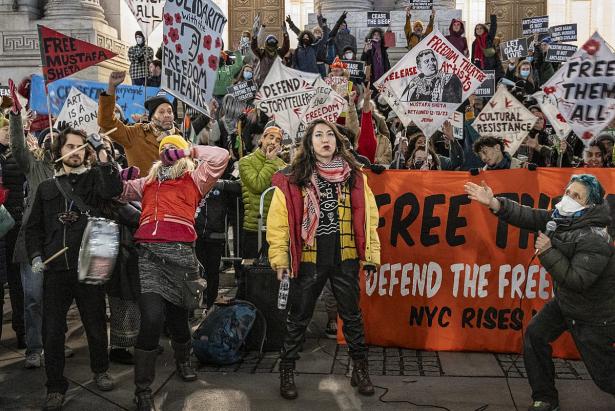
Spread the word